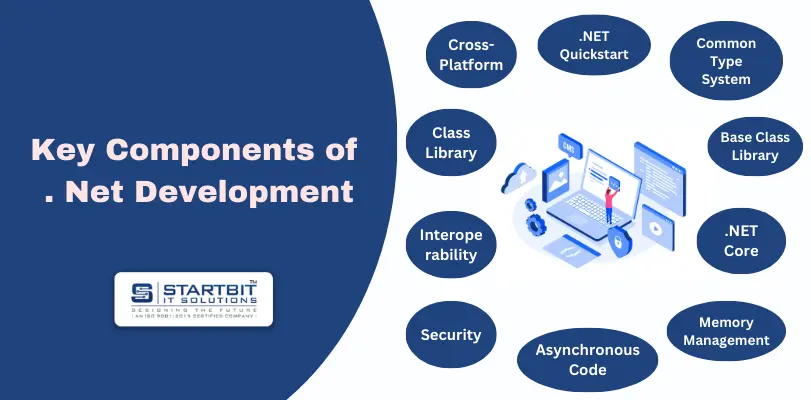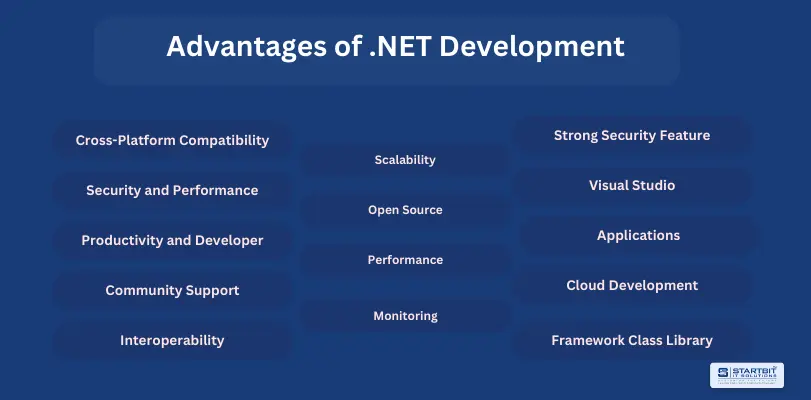Welcome to our exploration of .NET Development! Whether you’re a seasoned developer or someone just starting to delve into the world of programming, understanding what Dot NET Development is can open up a realm of possibilities for creating powerful and dynamic applications.
.NET is a free, open-source, cross-platform framework developed by Microsoft that enables developers to build a wide range of applications. It provides a consistent and comprehensive programming model for building applications, from web and mobile to desktop and cloud-based solutions.

Key Components of Dot Net Development:
- Framework Class Library (FCL): The FCL is a vast collection of pre-built, reusable code libraries that developers can leverage to perform common tasks, such as reading and writing files, networking, and database access. This eliminates the need to build these functionalities from scratch, saving time and effort.
- ASP.NET for Web Development: ASP.NET is a part of the .NET framework specifically designed for building dynamic web applications and services. It supports various web development models, such as Web Forms, MVC (Model-View-Controller), and Web API, allowing developers to choose the approach that best suits their project requirements.
- Xamarin for Cross-Platform Mobile Development: Xamarin, integrated into the .NET ecosystem, enables developers to create cross-platform mobile applications using C#. This means a single codebase can be used to target multiple platforms, including iOS, Android, and Windows, reducing development time and effort.
- Windows Presentation Foundation (WPF) and Windows Forms: WPF and Windows Forms are UI frameworks for building desktop applications on the Windows operating system. They provide rich user interfaces and are well-suited for a wide range of desktop applications, from simple tools to complex business applications.
- Entity Framework for Data Access: .NET includes Entity Framework, an Object-Relational Mapping (ORM) framework that simplifies database interactions. Developers can work with data using a higher-level, object-oriented approach, reducing the need for complex SQL queries and database management tasks.
- Common Language Runtime (CLR): The CLR is the execution environment in .NET responsible for managing memory, handling exceptions, and providing services like garbage collection. It allows different languages to be compiled into a common intermediate language (CIL), enabling cross-language integration.
- Class Library: The Class Library is a collection of reusable code components that provide pre-built functionalities. It includes classes and methods that developers can use to perform common tasks, saving time and effort in application development.
- Interoperability: Interoperability in .NET refers to the ability of different languages to seamlessly work together. It allows code written in one language to be used by another, facilitating integration and collaboration between diverse components.
- Security: Security in .NET is a comprehensive framework that includes mechanisms for code access security, role-based security, and encryption. It ensures that applications are protected against unauthorized access and malicious activities.
- Common Type System (CTS): CTS defines the types that can be used and shared across different .NET languages. It promotes uniformity in data representation and facilitates interaction between components developed in various languages.
- Languages: .NET supports multiple programming languages, including C#, VB.NET, F#, and more. This language flexibility allows developers to choose the language that best fits their project requirements and personal preferences.
- Base Class Library (BCL): BCL is a subset of the Class Library and contains essential classes and types for developing .NET applications. It provides core functionalities, such as file I/O, collections, and networking, forming the foundation for many applications.
- Common Language Specification (CLS): CLS is a set of rules that ensures language interoperability within the .NET framework. It defines a common set of features that all compliant languages must support, facilitating seamless integration of components written in different languages.
- Memory Management: .NET includes automatic memory management through garbage collection. This feature relieves developers from manual memory allocation and deallocation, enhancing the stability and reliability of applications.
- .NET Core: .NET Core is a cross-platform, open-source implementation of the .NET framework. It allows developers to build and run applications on Windows, Linux, and macOS, providing flexibility in deployment.
- Side-by-Side Execution: .NET supports running multiple versions of the framework on the same machine, ensuring that applications can use the specific version they were built with. This side-by-side execution minimizes compatibility issues.
- Asynchronous Code: Asynchronous programming in .NET enables the efficient execution of tasks without blocking the main thread. It enhances application responsiveness by allowing concurrent execution of multiple operations.
- Client Applications: .NET is used for developing a variety of client applications, including desktop applications (Windows Forms, WPF), web applications (ASP.NET), and mobile applications (Xamarin).
- Entity Framework: Entity Framework is an Object-Relational Mapping (ORM) framework in .NET that simplifies database interactions by allowing developers to work with databases using high-level, object-oriented code rather than SQL.
- Features: .NET offers a rich set of features, including support for modern language features, LINQ (Language-Integrated Query), and a wide range of libraries and tools that enhance developer productivity.
- .NET Quickstarts: .NET Quickstarts are resources that provide developers with concise and focused tutorials to quickly get started with specific aspects of .NET development, helping them learn and apply key concepts rapidly.
- Object-Oriented Programming: .NET encourages and supports object-oriented programming principles, such as encapsulation, inheritance, and polymorphism, promoting modular and maintainable code.
- Open Source: Many components of the .NET framework, including .NET Core, are open source. This fosters community collaboration, transparency, and the ability for developers to contribute to the framework’s improvement.
- Performance: .NET is designed to deliver high-performance applications. Just-in-time (JIT) compilation, optimized runtime, and various performance tuning options contribute to efficient execution of code.
- Portability: With .NET Core, applications can be developed and run on various platforms, providing portability across Windows, Linux, and macOS. This flexibility allows for wider deployment options.
- Productivity: .NET emphasizes developer productivity with features like a rich set of libraries, integrated development environments (IDEs), and language constructs that streamline common tasks, reducing development time and effort.
- Type Safety: Type safety in .NET ensures that variables are used in a manner consistent with their declared types. This helps catch errors during compilation rather than at runtime, enhancing code reliability.

Advantages of .NET Development:
- Cross-Platform Compatibility: .NET supports cross-platform development, allowing applications to run on Windows, Linux, and macOS. This flexibility is crucial for reaching a broader audience and accommodating diverse user preferences.
- Security and Performance: With features like code access security and a just-in-time compiler, .NET applications benefit from enhanced security and optimized performance. The runtime environment ensures that applications are executed securely, and the performance is consistently high.
- Productivity and Developer Tools: Visual Studio, the integrated development environment (IDE) for .NET, offers a comprehensive set of tools that enhance developer productivity. Features like code completion, debugging, and profiling tools contribute to a streamlined development process.
- Community Support: The .NET community is vibrant and active, providing a wealth of resources, forums, and open-source projects. This collaborative environment facilitates knowledge sharing, problem-solving, and continuous improvement within the .NET ecosystem.
- Interoperability: .NET supports interoperability with various languages and technologies, facilitating integration with existing systems and promoting a more cohesive development ecosystem.
- Scalability: .NET provides scalability through features like load balancing, efficient resource management, and support for cloud services, ensuring applications can handle increased workloads.
- Open Source: The move towards open source with .NET Core fosters collaboration, community contributions, and innovation, making it more accessible and adaptable to diverse development needs.
- Performance: .NET’s Just-In-Time compilation and optimization techniques contribute to excellent performance, ensuring efficient execution of code and responsiveness in applications.
- Caching: Caching mechanisms in .NET enhance application performance by storing frequently accessed data, reducing latency and improving overall responsiveness.
- Monitoring: Robust monitoring tools in .NET facilitate real-time performance analysis, error tracking, and debugging, enabling developers to identify and resolve issues promptly.
- Strong Security Features: Security features such as encryption, authentication, and authorization mechanisms are integral to .NET, safeguarding applications against various cyber threats.
- Visual Studio: The integrated development environment (IDE) Visual Studio provides a feature-rich, user-friendly interface for .NET development, enhancing the coding experience and productivity.
- Applications: .NET is versatile, supporting various application types, including web applications, desktop applications, mobile apps, and cloud-based solutions, providing flexibility in development.
- Cloud Development: .NET’s compatibility with cloud platforms like Azure facilitates seamless cloud development, enabling developers to build scalable and resilient cloud-based applications.
- Consistency: The consistent programming model and unified development environment ensure a standardized approach to development, making it easier for teams to collaborate and maintain code.
- Easy Maintenance: .NET’s modular architecture, strong versioning support, and clear documentation contribute to easier maintenance, reducing the complexity of updates and bug fixes.
- Flexibility: .NET’s modular design and support for various programming languages offer flexibility, allowing developers to choose the best tools and languages for specific tasks within a project.
- Framework Class Library: The extensive Framework Class Library provides pre-built, reusable code components, saving development time and effort while promoting consistency across applications.
- Improved User Experience: .NET’s capabilities for creating rich user interfaces and the use of modern design principles contribute to an improved and engaging user experience in applications.
- Memory Management: Automatic memory management in .NET, through features like garbage collection, simplifies memory handling, reducing the likelihood of memory-related errors and enhancing application stability.
- .NET Core Enables Flexibility: .NET Core, being modular and lightweight, allows developers to choose and use only the necessary components, promoting flexibility in application architecture.
- Object-Oriented Programming: .NET’s strong support for object-oriented programming principles encourages code organization, reusability, and maintainability, enhancing the overall structure of applications.
- Rapid Application Development: .NET’s extensive set of tools, libraries, and frameworks enable rapid application development, allowing developers to build and iterate on projects quickly.

.NET development empowers developers to create robust, scalable, and cross-platform applications, making it a versatile framework for a wide range of projects. Whether building web applications, mobile apps, or desktop software, .NET offers a rich set of tools and resources to meet the demands of modern software development.
Startbit IT Solutions understand the dynamic nature of the digital landscape and the pivotal role that technology plays in shaping successful businesses. Our development services are tailored to empower your business and propel it to new heights. Whether you’re a startup looking to establish a strong online presence or an established enterprise seeking to enhance your digital capabilities, we have the expertise to meet your unique needs.
Why Choose Startbit IT Solutions.net Developers for Your Development Needs?
- Expertise Across Technologies: Our team of seasoned developers is proficient in a diverse range of technologies, ensuring that we can deliver solutions that align with your business objectives.
- Customized Solutions: We believe in one-size-does-not-fit-all. Our development services are tailored to suit the specific requirements of your business, providing you with a unique and effective digital solution.
- Agile Development Approach: In the fast-paced world of technology, adaptability is key. We follow an agile development approach, allowing us to respond promptly to changes and deliver results in a timely manner.
- Scalability: As your business grows, so should your digital solutions. Our scalable development services ensure that your technology infrastructure can seamlessly expand to accommodate the evolving needs of your business.
- User-Centric Design: We prioritize the user experience in our development process. Our designs are not only visually appealing but also intuitive, ensuring a positive and engaging interaction for your customers.
- Security and Compliance: We take the security of your digital assets seriously. Our development practices adhere to industry standards and regulations, providing you with peace of mind regarding data protection and compliance.

